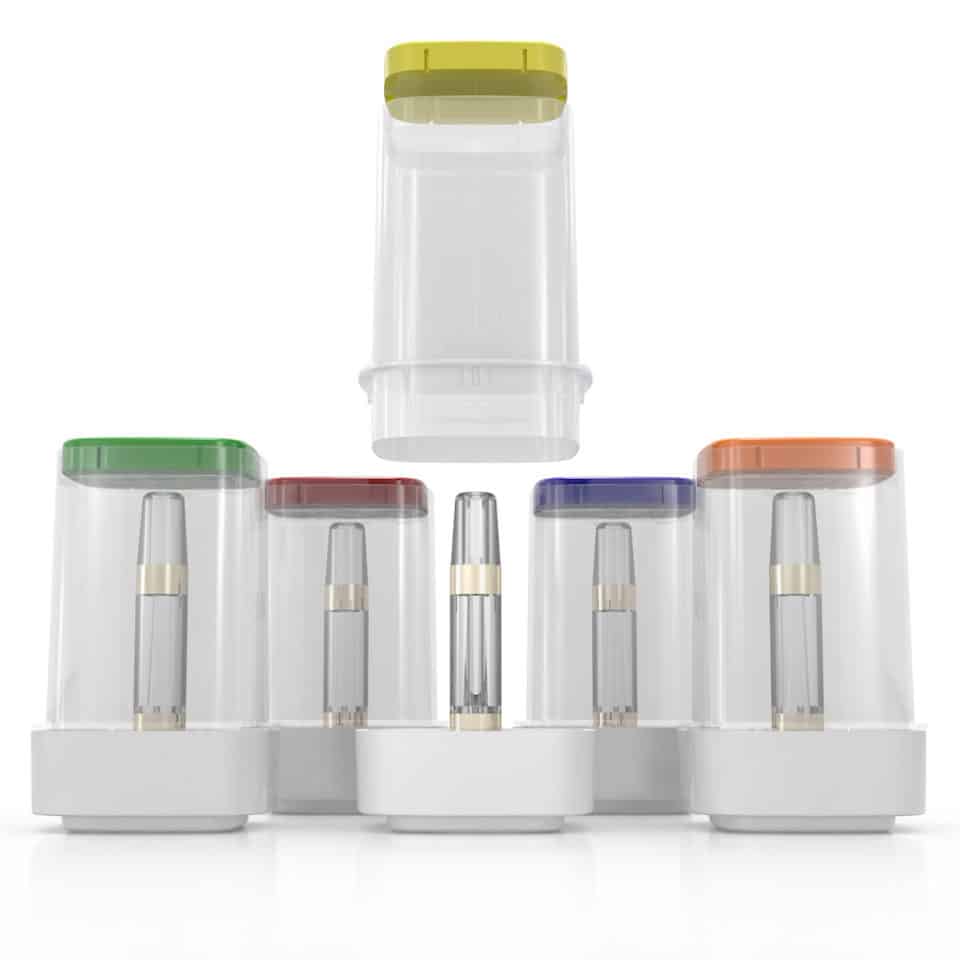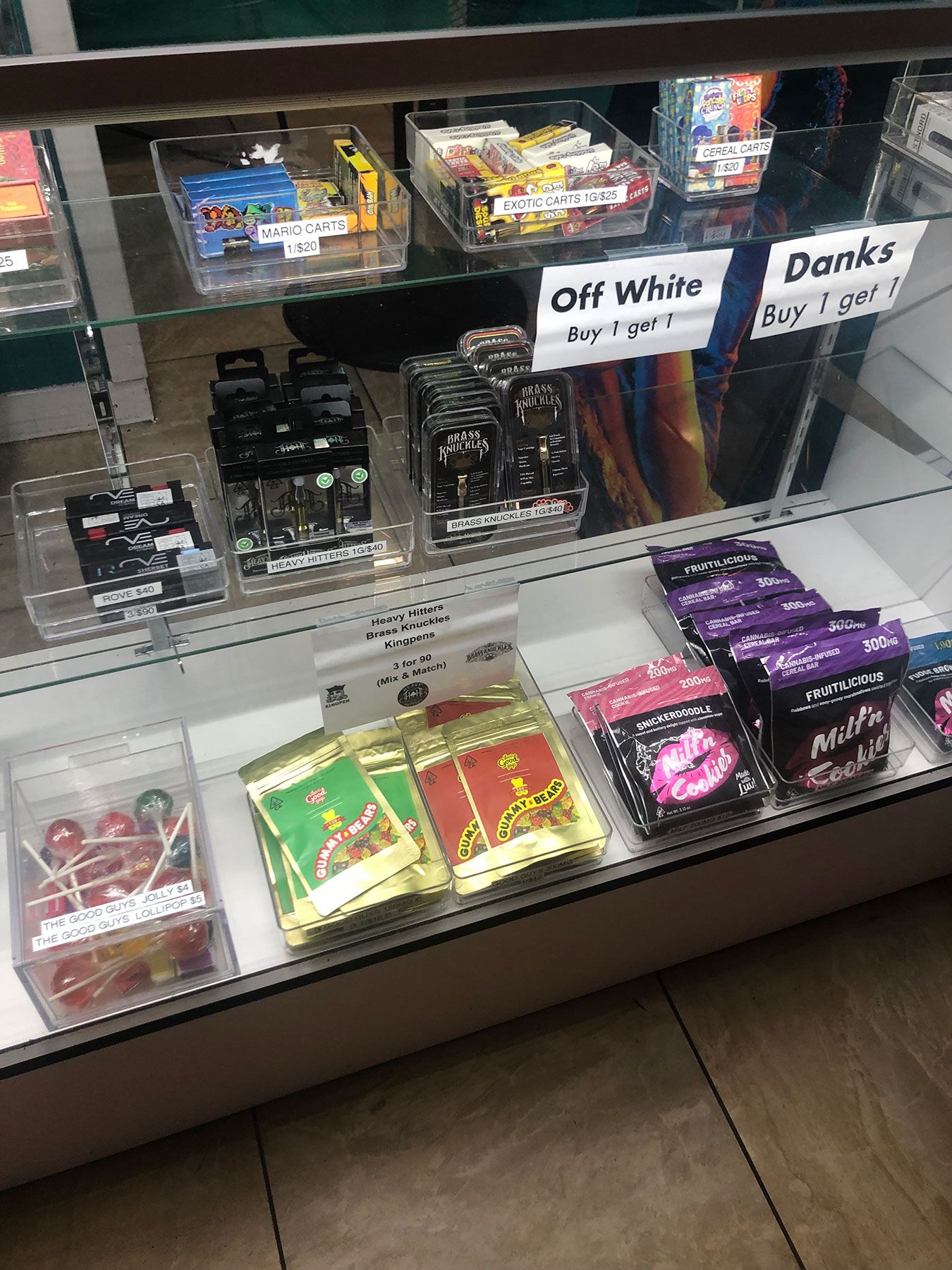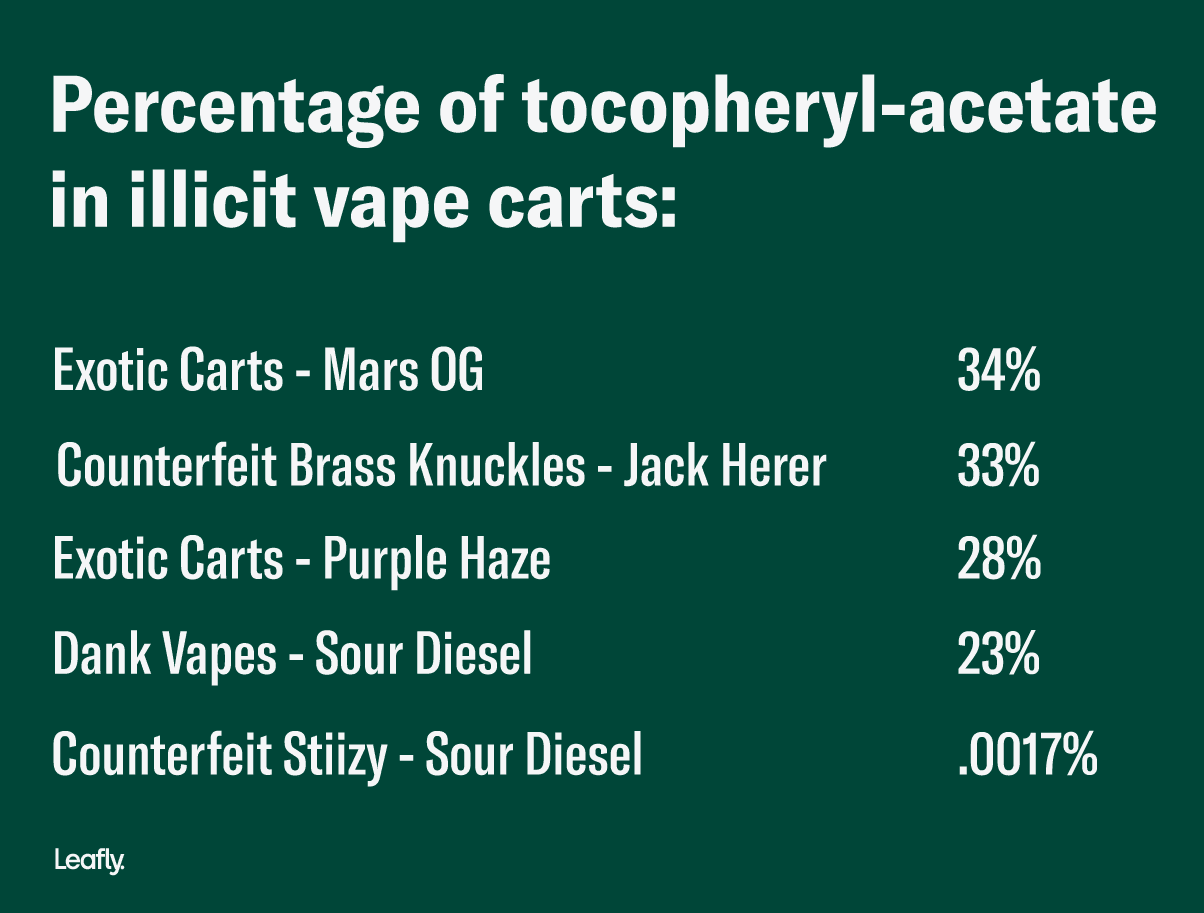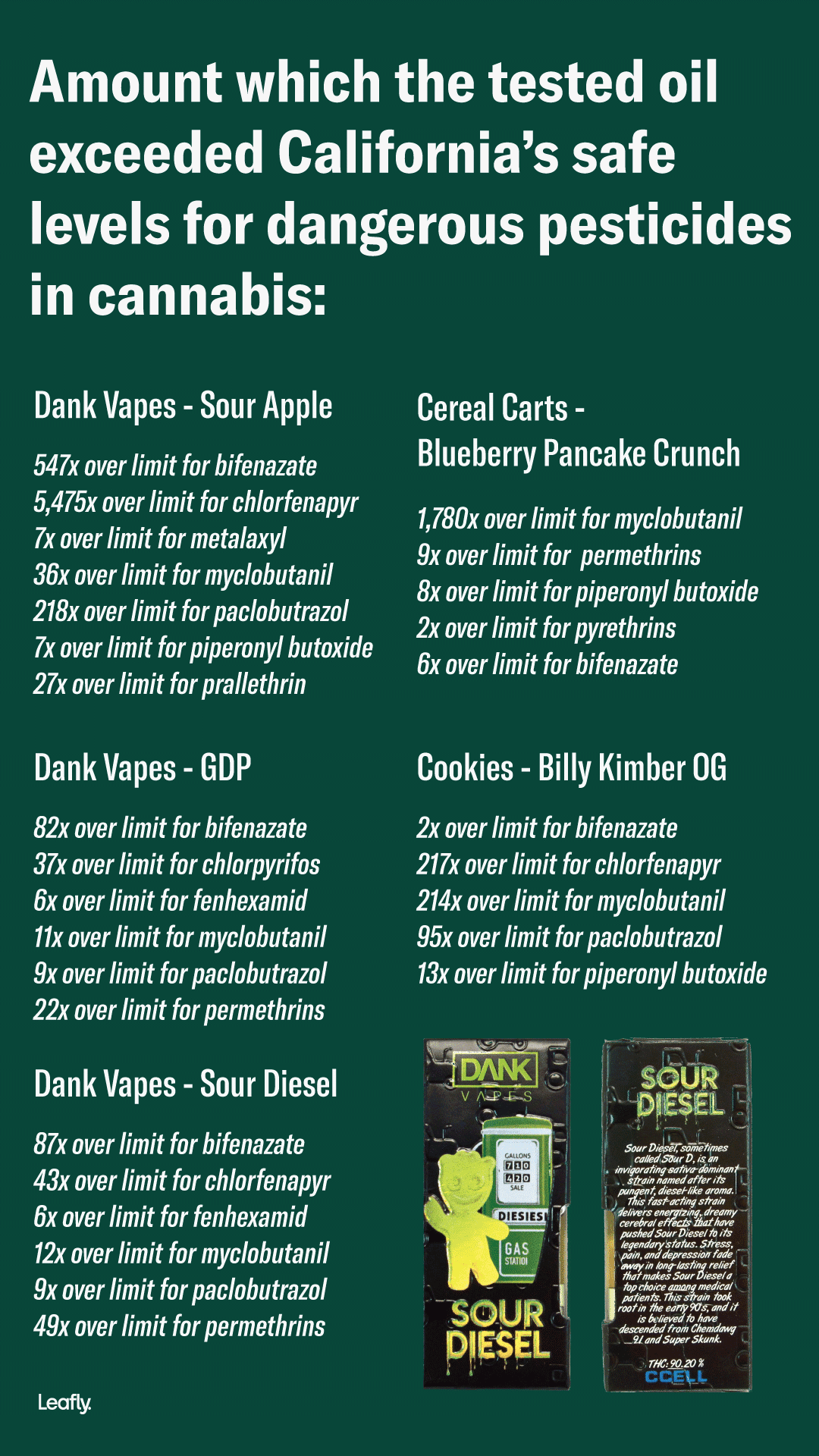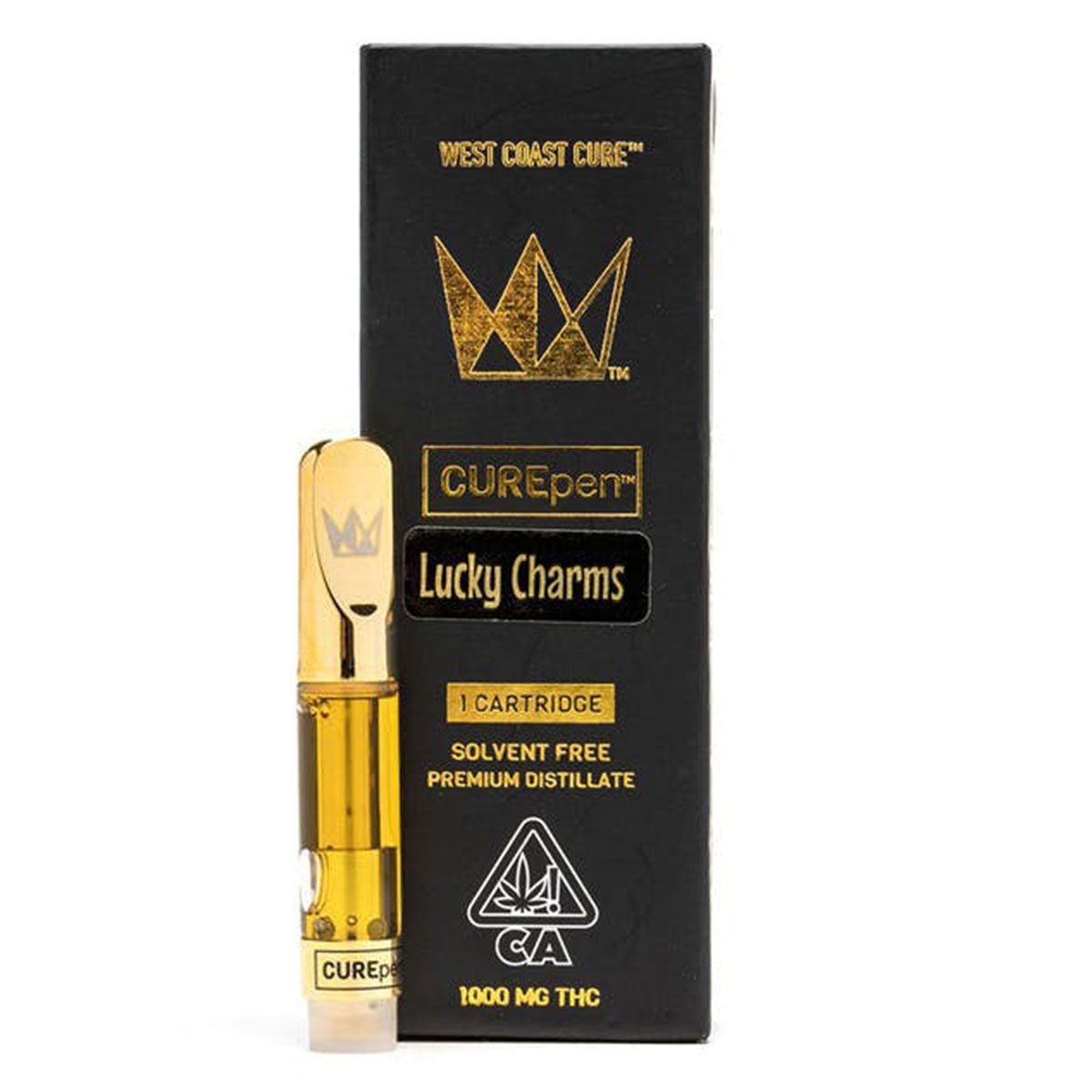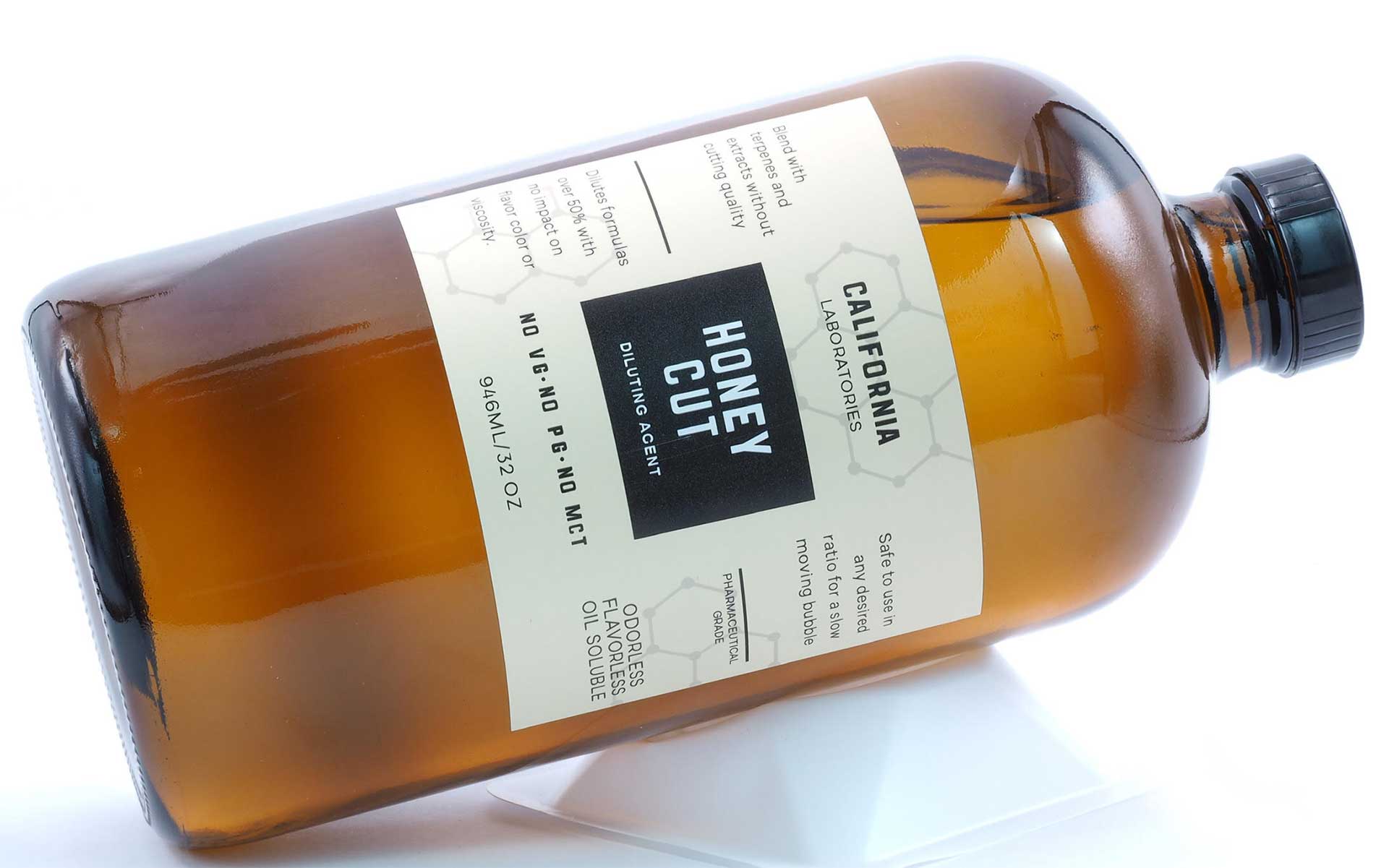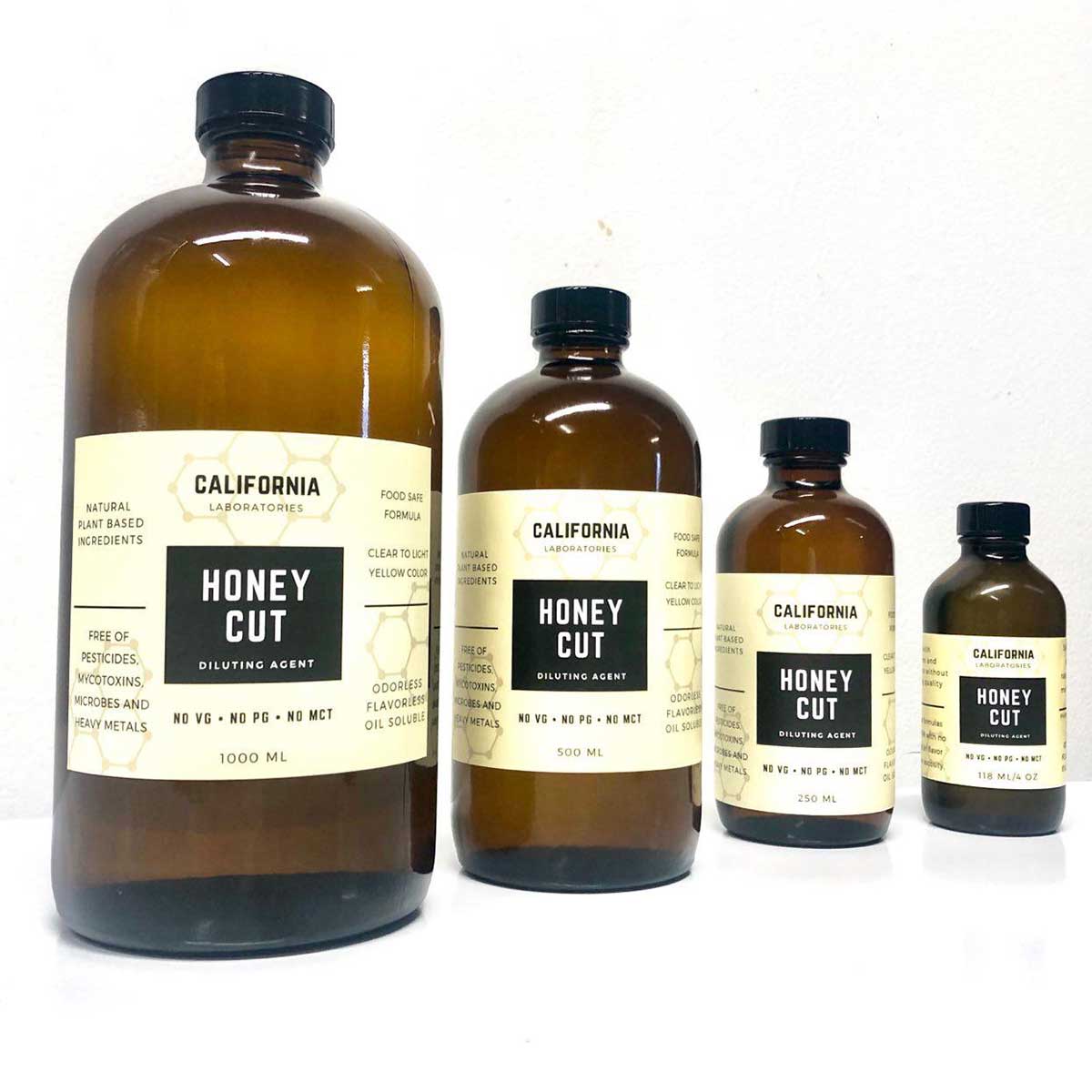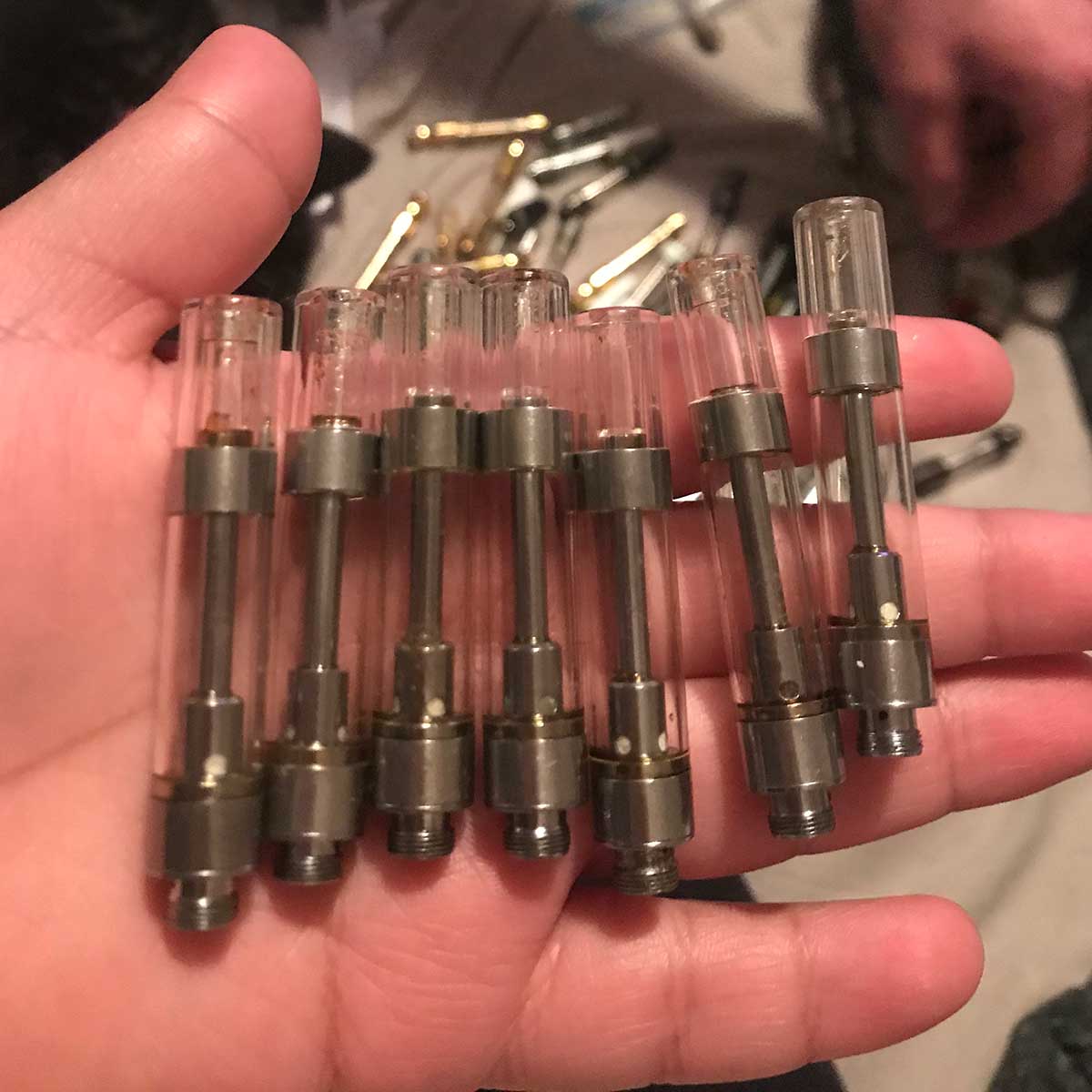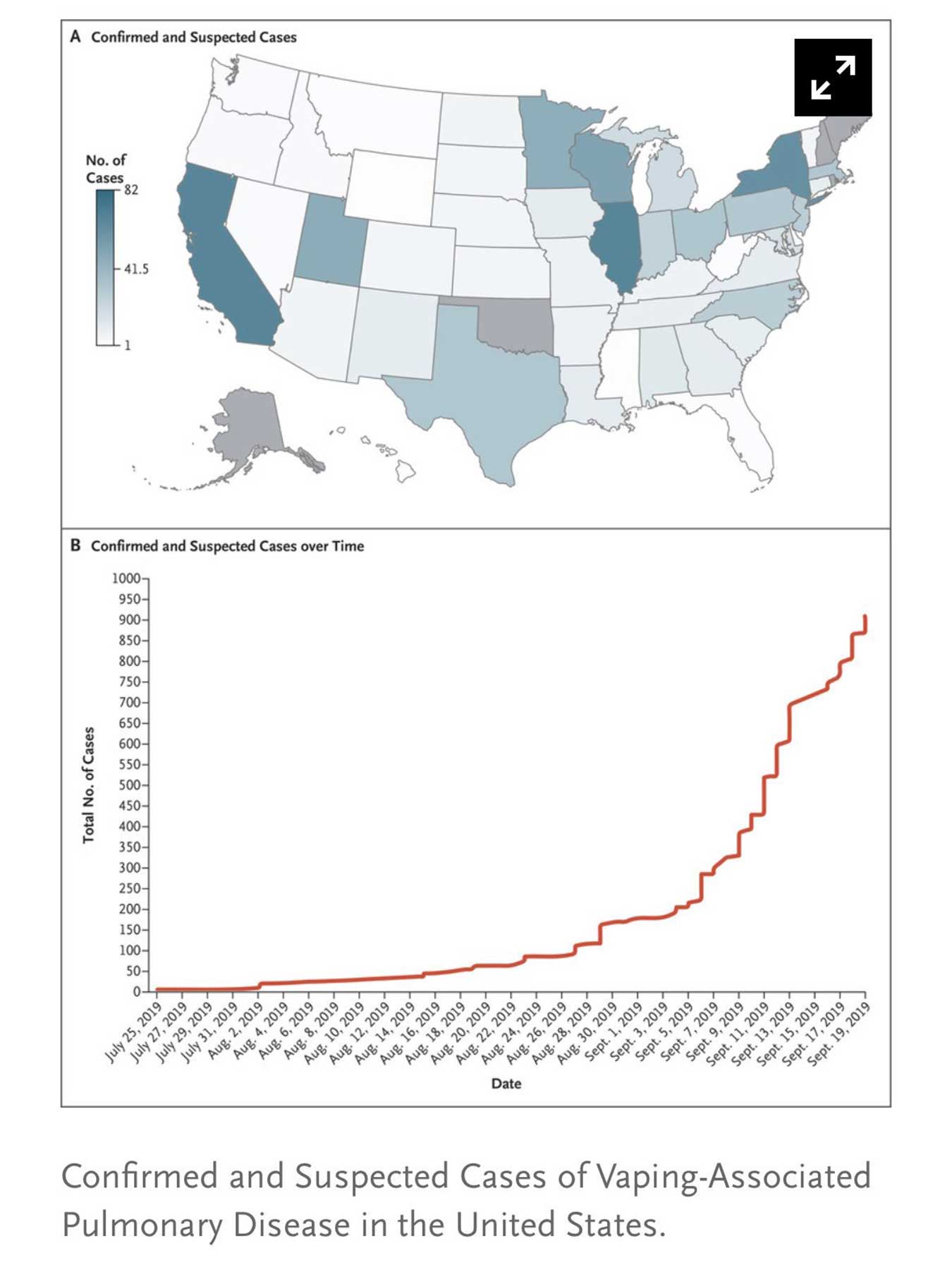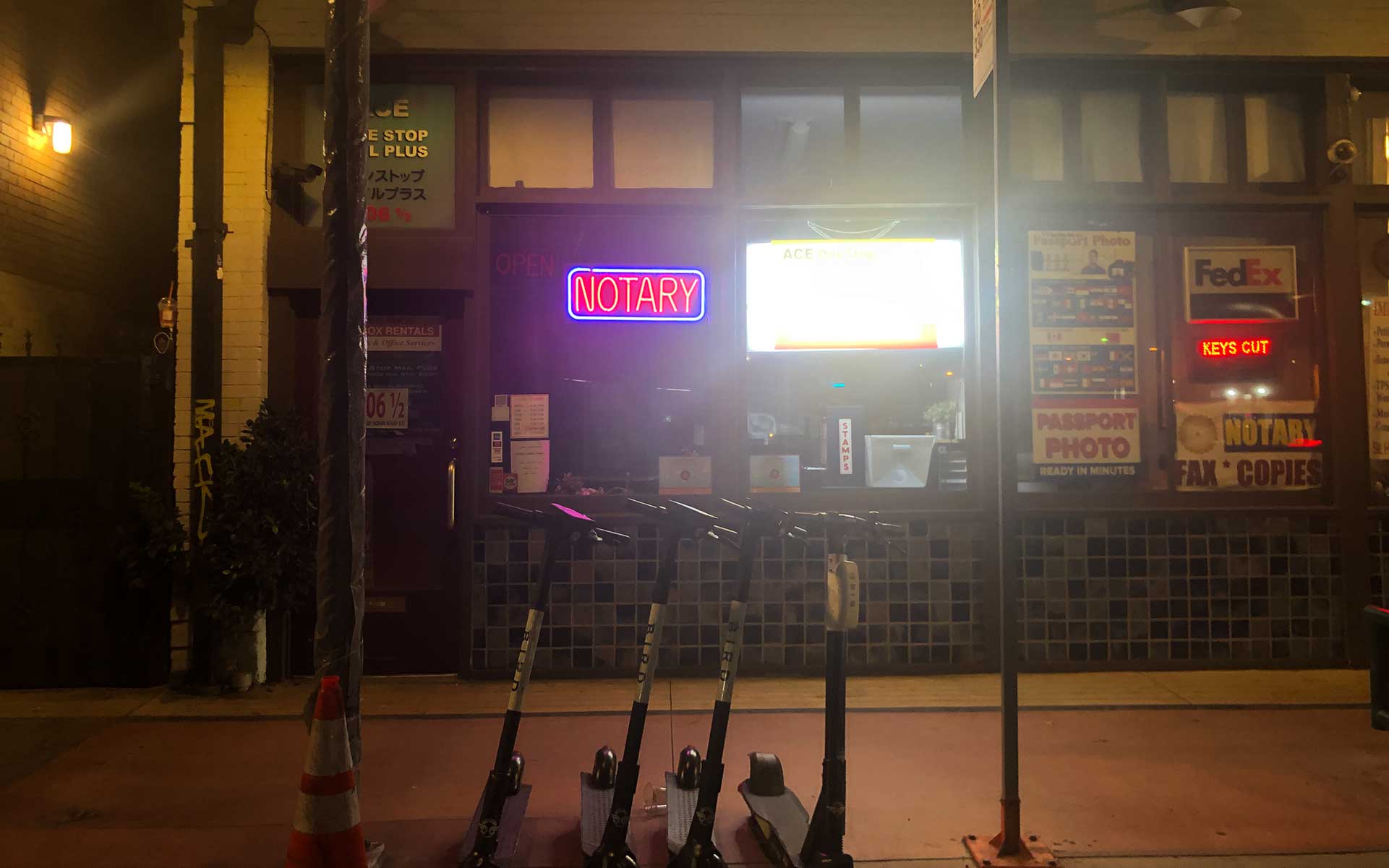From ‘Veronica Mars’ to toxic vapes: The rise and fall of Honey Cut
By Marissa Wenzke, with David DownsNovember 8, 2019
More than 2,051 Americans are sick and 39 have died from vaping-associated pulmonary injury (VAPI) this year.
Honey Cut became a vape industry phenomenon. But nobody knew who founded or ran the company—until now.
There are many suspects, but the US Centers for Disease Control’s “very strong culprit of concern” is a new cutting agent found in illicit THC vaporizer cartridges across the nation. Tocopheryl-acetate, also known as vitamin E oil, surged in popularity on the street market ahead of the lung injury outbreak last summer.
Industrial chemical manufacturers have sold vitamin E oil for years, but only as an ingredient in hand lotions or gummy vitamins. So who turned tocopheryl-acetate into a wildly popular and potentially deadly vape cartridge additive?
Multiple industry experts point to a mysterious, low-profile Los Angeles company called Honey Cut. By creating a new category of “thickening” vape cartridge additives, Honey Cut became a nationwide phenomenon. Its formula—and copycat products just like it—suddenly turned up last year in illicit THC vape cartridges nationwide.
The company itself appeared to be a kind of corporate ghost ship. Its name was attached only to a website and a P.O. box. Nobody knew who founded Honey Cut, who ran it, or who profited from it.
Until now.
A bottle of Honey Cut obtained on Craigslist for testing by California-based SC Labs in Sept. 2019. The vape juice cutting agent consisted of 95% tocopheryl-acetate. Industrial chemical manufacturers warn against inhaling the substance. (Courtesy of SC Labs)
Honey Cut founder revealed
Leafly’s investigative team followed a trail of corporate filings and online business activity that points to one man, a former television actor and casting associate named Joshua Mathias Temple, as Honey Cut’s founder and CEO.
Josh Temple didn't find fame as a Hollywood actor, but as Honey Cut's inventor he achieved a kind of infamy in LA's cannabis culture.
Temple never found fame on stage or screen. During the mid-2000s, he nabbed a few bit parts in TV shows. He did a 48-second scene with Kristen Bell on season one of the UPN series
Veronica Mars, and in later years mostly worked as a casting assistant. (Temple is not to be confused with another, better-known actor and TV host with the same name,
Josh Temple of House Crashers fame.)
Josh Temple the actor/casting assistant didn’t hit it big in Hollywood, but as the inventor of Honey Cut, he achieved a kind of infamy within the cannabis culture of Los Angeles. He created one of the fastest-selling non-cannabis products the illicit drug market has ever seen. And he may have dealt a crippling blow to the entire vaping industry in the process.
Related
Vape pen lung injury: Here’s what you need to know
Temple, his lawyer, and Honey Cut company officers refused to comment to Leafly, or, to our knowledge, speak publicly anywhere about the company.
Exploiting lax federal enforcement and regulatory loopholes in California, Temple and his company used little more than a shipping address and a logo to divert drums of vitamin E acetate into millions of illicit THC vape cartridges nationwide.
When injuries mounted and signs pointed to the potentially toxic nature of inhaled tocopheryl-acetate, Temple shut down the Honey Cut website and deleted what appears to be his Instagram account. No explanation has ever been given to the public.
This is the story of the rise and fall of Honey Cut.
A newcomer arrives in Hollywood
Like many young aspiring actors, Josh Temple came to Los Angeles to build a career in movies and television. His former acting agent, Carol Shamon-Freitas, told Leafly that Temple grew up out of state. Joshua M. Temple’s
IMDB page shows that he worked as an actor and casting associate from 2005 to 2010.
As an actor, he landed minor roles in TV shows like
Veronica Mars from 2005 to 2007. He saw steadier work as a casting associate, working on 39 episodes of
Veronica Mars as well as pilots and basic cable series including
The Ex-List, Terriers, American Heiress, Saints & Sinners, Wicked Wicked Games, and
Fashion House.
Shamon-Freitas described him as “truly one of the nicest, kindest, and most sincere people I’ve known.”
Housing records from Zillow and various corporate filings indicate Temple lived in Woodland Hills, California, from 2014 to August 2019. Shamon-Freitas confirmed that he transitioned from the entertainment business to cannabis sometime after 2010.
Moving into the vape industry
Between 2011 and 2018, Temple worked in the unregulated vaping space, according to archived statements on the now-defunct company website,
Honeycutvapes.com. During that period, Temple likely became fluent with the properties of different cutting agents for nicotine and THC vaporizers, known as diluting agents.
According to an archived “about the company” statement on
Honeycutvapes.com:
“The Honey Cut’ brand was officially founded in 2011 but we just recently started taking off in [2018-2019]. For the past 10 years we’ve been dedicated to creating the best diluting agent for our clients and in this past year our hard work is all paying off.”
In 2012, THC vape products were a mere curiosity. Six years later, they accounted for a quarter of all legal cannabis sales.
Los Angeles has always nurtured cannabis. It’s been a fixture in the Hollywood scene since the early days of film. But in the 2010s, hundreds of cannabis dispensaries popped up around the city, driven by vague laws, nonexistent regulation, and the sheer size of the city and its massive cannabis market.
As the city’s cannabis industry grew, so did the market for vaping and vape products. The early e-cigarettes (think:
Stephen Dorff hitting the Blu) were a novelty at first, but the convenience offered by the products created a new industry. Nicotine vape devices went from disposable to reusable and refillable. Cannabis entrepreneurs began filling vape setups with THC oil, and they quickly became the hip accessory to have.
Most vaping devices pair a rechargeable battery with a screw-on reservoir (known as a cartridge) filled with either liquid nicotine or THC oil. Vapes dispensed low doses of THC without the telltale odor of burning cannabis, and the small size of the devices offered discretion amid the social stigma—and criminal penalties—attached to the use of cannabis.
In 2012, THC vape products
barely registered as a market category. Six years later, they accounted for half of all THC extract sales and a quarter of all product sales, according to
BDS Analytics.
The first vitamin E oil study
In 2013, researchers at Northwestern University published a study that may have indirectly inspired a host of unintended consequences.
“
Two Faces of Vitamin E in the Lung,” printed in the
American Journal of Respiratory and Critical Care, described alpha tocopherol—one of eight closely-related chemicals in the vitamin E family—as potentially helpful for some pulmonary conditions. The study found that the substance, available in sunflower oil and olive oil, could protect humans from adult-onset asthma and might have a “beneficial effect on lung function.”
One of the study’s critical details, though, was that the researchers were studying the effects of
eating vitamin E, not
inhaling it.
Related
Everything you need to know about pre-filled oil vape cartridges
Heating and inhaling it
Two years later, in 2015, Constance Finley applied for a patent on a vape pen containing CBD and vitamin E. Finley is the founder of the San Francisco medical cannabis company Constance Therapeutics,
Finley ran her idea by an organic chemist, a molecular biologist, and a clinical herbalist before analyzing what happened when they heated alpha tocopherol to 750°F. Large-scale clinical research simply didn’t exist.
“We did what we could,” Finley told Leafly. “We analyzed what came out of the vapor in a balloon study.”
According to Finley, more than 4,000 customers over seven years used her company’s product without incident. She contends that one form of the chemical—alpha tocopherol—is safe in low amounts, while other forms, like tocopheryl-acetate, may not be. No peer-reviewed studies exist to confirm or disprove this thesis.
Finley’s patent application for the use of vitamin E in vape pens may have inspired Honey Cut. Patent applications are public documents, available to anyone online.
“What we’re told is all these people that started using vitamin E acetate did so by copying our patent,” Finley said. But the copy either proved to be imperfect, or the knockoff artists deliberately altered the formula to avoid infringing on Finley’s pending patent. “I was shocked and kind of horrified to have this influence,” she said. “Because it’s really stupidity.”
Temple forms a Honey Cut precursor
In early 2018, Josh Temple formalized his role in the vape supply industry by registering a company called See/Be.
Temple is listed as the CEO on the state
incorporation document for See/Be Health, LLC, registered on Jan. 9, 2018. The company’s listed address was identical to a future address of Honey Cut. Temple described See/Be in California’s business registry as a provider of “health supplements.”
If you want to import large amounts of vitamin E oil into the United States for resale into the vape supply market, designating your company as a health supplement provider is a smart way to do it. Vitamin E is a common dietary supplement subject to little regulatory control. Anyone can buy pails of it online.
Upon further inspection, that Santa Monica address turns out to be an office space with a mailbox drop. An employee there told Leafly that Temple only used the address to pick up mail, and the account had been closed down by late September 2019.
An accidental invention?
Arnaud Dumas de Rauly is CEO of The Blinc Group, a consulting firm that works with legal vape hardware makers to optimize manufacturing processes. He’s also helped set international manufacturing standards for vape products. De Rauly has a theory about how Temple and See/Be invented Honey Cut: accident, not malice.
Honey Cut debuted in early 2018. The bottles promised a 'Pharmaceutical Grade' product 'safe to use in any desired ratio.'
In trying to copy Finley’s research and patent-pending product, de Rauly speculates, Temple made an error in his formulation. “I’m pretty sure these guys had the best of intentions,” he said.
Vape industry insiders indicate that Honey Cut began appearing in the spring of 2018, about two to three months after the See/Be Health, LLC registration. The bottles promised a “Pharmaceutical Grade” product “safe to use in any desired ratio.”
Honey Cut itself contained no THC oil. It was a legal additive that the makers of illicit THC vape cartridges used to dilute the THC oil in their carts.
Peter Hackett—owner of Air Vapor, a Concord, California-based vape hardware wholesaler that operates within the legal sector—said that around that same time, some of his Southern California customers started asking for a product called Honey Cut.
A secret formula: 90% vitamin E oil
Although Honey Cut never disclosed its secret formula, testing by SC Laboratories in Santa Cruz showed that a 32 oz. bottle of Honey Cut bought off Craigslist in September 2019 contained 90% to 95% pure vitamin E acetate. The remaining portion contained other forms of vitamin E. Tests by New York health officials corroborated the finding.
Honey Cut's 'complex compound' turned out to be very simple—and potentially toxic.
Honey Cut moved untold gallons of 90% pure vitamin E acetate into the nation’s illicit vape market. This wasn’t a case of vape makers using Honey Cut for an off-label purpose without the manufacturer’s knowledge. Honey Cut’s own website described the product as “A complex compound used primarily in the vape cartridge industry as a thickener to eliminate bubble movement and leakage.”
Meanwhile, chemical companies making actual vitamin E acetate posted easily
accessible manufacturer’s safety data sheets that warned against inhaling the compound. If inhaled, one data sheet advised, “remove from area of exposure. If breathing is difficult, give oxygen. Seek medical attention if symptoms persist.”
Buzz in the market
Over the summer of 2018, the new cutting agent quickly gained momentum. Seemingly every illicit vape cart maker wanted liters of the magical diluent. “If you didn’t carry Honey Cut, you were [seen as] a sore loser,” Hackett recalled.
Despite the demand, Hackett refused to carry Honey Cut or similar thickeners, due to their unknown formulations and untested status as a vape additives. Although it cost him a lot of business at the time, Hackett now believes the decision may have saved people’s lives.
What made Honey Cut so popular?
Honey Cut took off because it made illicit vape cartridge makers a lot of money. The product fooled consumers into thinking they bought something pure. Honey Cut’s color and thickness closely resemble that of pure THC oil. It’s available online and does not affect the appearance or flavor of THC oil. As such, it fooled consumers performing what’s known as the “
bubble test.”
Pure THC extract is a thick amber oil, and traditional THC oil cutting agents thin the oil. In response, customers learned to detect cut oil by flipping over vape cartridges to see how the air bubble moves inside the tank—much like the bubble in a carpenter’s level. A fast-moving bubble means the oil had been thinned with a cutting agent and wouldn’t deliver the high THC potency a consumer desires.
Related
Journey of a tainted vape cartridge: from China’s labs to your lungs
Tocopheryl-acetate defeats the bubble test by cutting THC oil without thinning it. For years, THC oil had been mixed with the common additives propylene glycol or vegetable glycerin, used to allow the oil to flow and contact the vape pen’s heating device. Instead of 10% or 15% propylene glycol cuts, vape cartridge makers could cut THC oil by up to 80%, Honey Cut promised, and consumers would never know.
The chemical created huge profit margins for Honey Cut. Temple could import raw vitamin E acetate for
$8.50 to $42.60 a liter (converted from gallons), re-package it, and mark it up to between
$1,100 and
$1,350 a liter. That’s about a 1,300% markup on every liter.
Even with the import markup, illicit THC vape cartridge fillers who spent $1,000 on a liter of Honey Cut could fool consumers by stretching their supplies of THC oil and
pocket an extra $5,000 in profit.
Vitamin E acetate also remains perfectly legal to sell in any form. Illegal THC vape cartridge makers shoulder all the legal risk.
Online chatter, booming sales
By late 2018, Honey Cut sales boomed as word spread on
Instagram and online forums like
Future4200. Pictures of Honey Cut inside downtown Los Angeles storefronts circulated on
Reddit.
The company’s success did not go unnoticed. Competing products like Floraplex’s
Uber Thick, Mr Extractor’s
Clear Cut, and Peak Terpenes’
Thicc Stretch soon battled for market share.
Insiders describe
440-pound drums of the stuff moving out the front and back doors of wholesale vape suppliers in downtown Los Angeles in early 2019. Honey Cut could be found on
many major ecommerce sites, as well as through the Honey Cut website.
With an office just blocks away, Honey Cut became an overnight staple in the storefront market for wholesale vape supplies in downtown Los Angeles. (David Downs/Leafly)
Trademark, incorporate, sell sell sell
By the spring of 2019, Honey Cut’s success apparently made the company’s founder think about protecting his assets. “Just in the first four months of 2019, we had more sales than all of 2018,”
Honey Cut’s website stated. So Temple filed an
application with the US Patent and Trademark Office (USPTO) on March 8 to trademark the Honey Cut logo. On the application, the Honey Cut founder listed the same email as he did on his old IMDB Pro account back in his acting/casting days.
Three days later, Temple
registered Honey Cut Labs as a limited liability corporation with the State of California.
Temple described Honey Cut in the USPTO application as an “electronic cigarette liquid (e-liquid) comprised of flavorings in liquid form.” He stated it contained propylene glycol and vegetable glycerin, compounds widely used in vaping products. Nowhere on the application were the words “vitamin E acetate” mentioned.
On June 19, Honey Cut posted to
Instagram a video of boxes and boxes of amber glass jugs filled with the thickener prepped for shipping. The operation was pumping.
Honey Cut succeeded at branding more than anything. This photo, taken from the company’s trademark filing documents, illustrates the brand’s clean design and variety of purchase volumes. (Courtesy of USPTO)
First reports of lung injuries
The first troubling medical reports came in mid-July 2019. Public health officials in Illinois and Wisconsin announced the identification of an unprecedented cluster of lung injuries among teen vapers. Public health leaders in Kings County, California, said they too located a similar injury cluster.
Those initial clusters triggered nationwide surveillance by the federal Centers for Disease Control. Public health officials began connecting dots. The victims weren’t infected with a virus or bacteria. Instead, they shared a history of vaping—specifically, for most of them, vaping THC from illegal cartridges purchased on the unregulated street market.
Looks like pneumonia, but it’s not
Early on, doctors read the onset of VAPI symptoms as odd cases of pneumonia. Patients were sent home with antibiotics, only to return much sicker days or weeks later.
Inside the lungs, the injury worsened. Vitamin E acetate disrupts the function of the lungs’ fluid lining, impeding oxygen transfer, and triggering a progressive and severe immune reaction. Some
reports indicate a person’s lungs can begin to lose function as quickly as a week after exposure to THC oil heavily cut with vitamin E acetate.
“When you inhale this fatty substance, it sort of acts like a soap,” said Josh Wurzer, president of SC Laboratories, a state-licensed cannabis testing lab based in Santa Cruz, California. “When it gets in your lungs, it breaks up all the surface chemistry that’s happening with your lungs and really interferes with the exchange of oxygen into your bloodstream.”
Testing one victim’s vapes: tainted and toxic
One VAPI victim, Utah resident Kyle DeGraw, told Leafly he had never heard of Honey Cut. Vape-related
lung distress sent DeGraw, to the hospital for five days in July. Over the past year, he often shopped for illegal THC carts by flipping a cartridge over to see how the oil moved. If the bubble moved too fast, Kyle refused to buy it. But that trick didn’t work with Honey Cut.
“You can’t tell even if [the bubble moves] slow?” DeGraw asked Leafly. A dark realization came over him. “I don’t know, actually, what’s inside.”
Utah VAPI victim Kyle DeGraw experienced a progressively worsening condition this year after using Dank Vapes and counterfeit Rove cartridges obtained from illicit markets. SC Labs initially found significant amounts of vitamin E oil in them. Subsequent testing also strongly implicated pesticides and heavy metals. (Courtesy Kyle DeGraw)
All summer, DeGraw had inhaled cart after cart from boxes labeled Dank Vapes and Rove. Leafly had the remaining oil in DeGraw’s spent cartridges tested by SC Labs.
Those tests turned up disturbing results. SC Labs President Josh Wurzer said DeGraw had inhaled “significant amounts of alpha-tocopherol” as well as troubling amounts of lead from his illicit THC carts.
Subsequent testing came back negative for tocopherols, but
extremely high for pesticides and lead. Wurzer found sky-high levels of “literally dozens” of pesticides in “insane concentrations.” SC Labs’ machines, he said, aren’t set up to detect such high amounts. “This might take the prize for [the] most pesticide-contaminated sample we have ever tested,” said Wurzer.
On Nov. 8, the CDC announced it had found tocopherols in 29 lung victim biopsies. “No other potential toxins were detected,” said CDC Dr. Anne Schucat.
Reports of VAPI skyrocketed in the US this summer. (Courtesy NEJM)
Honey Cut starts closing down
As news of the outbreak spread, the Honey Cut team appears to have cut and run.
The company Instagrammed a picture of
one of its distributors’ booths at an event Aug. 16, but later deleted it.
Public health officials reported the first vaping-related death on Aug. 23. On that same day, Honey Cut
changed its registered corporate address to a postal box at Ace One Stop Mail Plus, near the wholesale storefronts that sold much of the company’s product. “Do not list a PO Box” the official LLC form states. Temple did it anyway.
The address for the Honey Cut Labs LLC is a PO box at this Ace One Stop Mail Plus storefront in downtown L.A. (Marissa Wenzke for Leafly)
On Aug. 27, Temple changed the official ownership of See/Be Health to add a person named
Ashley Angstadt. According to now-deleted (but still cached)
Instagram activity, it appears that Angstadt and Temple were dating at the time and lived together. After Aug. 27, Angstadt appeared in state business records as owner and manager of the company.
On Aug. 30, Leafly published
its investigation into illegal vape cartridge additives—the first to name Honey Cut and highlight the company’s suspected role in the outbreak. In response, Honey Cut called its downtown Los Angeles wholesalers and ordered a recall of its products. Company officials demanded that storefront wholesalers remove Honey Cut from store shelves.
By Sept. 6, Honey Cut’s website had gone offline.
Honey Cut officials subpoenaed
On Sept. 9, New York Gov. Andrew Cuomo announced a subpoena for Honey Cut and two other makers of thickening agents after health officials discovered the products contained “nearly pure vitamin E acetate oil.”
New York State public health officials want details on Honey Cut’s safety testing, ingredients, sales data, and “the quality of the raw materials and the final product,” according to department spokeswoman Jill Montag.
Panicky record changes at See/Be
On Oct. 9, Leafly’s investigative team contacted See/Be Health CEO Ashley Angstadt by email. She did not respond, but two days later Angstadt’s name disappeared from
state records connected to See/Be. She never responded to Leafly’s requests for information and comment.
See/Be Health has also changed its purpose of business in state records—often. In late August, the business purpose switched from “health and beauty supplements” to “distribution.” On Oct. 11, it became “health supplement manufacturing.” On Oct. 14, the company’s stated purpose changed to “
health and wellness services”—removing the term
supplement entirely.
Since Oct. 14, neither See/Be Health, nor Honey Cut or any of the company’s officials, have offered a statement. Officials at the New York State Health Department told Leafly they are in contact with Honey Cut, but declined to provide details due to their ongoing investigation. Josh Temple appears to have moved out of his Woodland Hills home in mid-August. It’s unclear whether he remains in the Los Angeles area.
Nobody paid attention
Industry insiders who spoke with Leafly were at a loss to explain how vaping products, illegal or not, ended up tainted with vitamin E acetate—something so obviously not meant to be inhaled.
'It’s unconscionable to sell anything to people where you can’t be sure you’re not going to injure them.'
J.D. Ellis, cannabis industry engineer
“It’s unconscionable to sell anything to people where you can’t be sure you’re not going to injure them,” said J.D. Ellis, a well-known cannabis industry engineer who moderates the influential online cannabis forum
IC Mag.
The lack of clinical trials on tocopherols for inhalation should have given Honey Cut officials pause, said Blinc Group CEO de Rauly. “When you’re working with people’s health,” he said, “you have to go in there and figure it out and learn. If you don’t do that, you’re not being responsible.”
Don’t assume it’s safe
When Honey Cut came on the market, illicit vape cart makers assumed it was a harmless variation on propylene glycol or vegetable glycerin.
SC Labs co-founder Josh Wurzer understands how consumers were taken in. “You just assume, ‘Well this wouldn’t have even been allowed in the market if someone hadn’t looked at it and found it to be at least relatively safe.’ That’s just not the case.”
Honey Cut didn’t fall under the regulatory authority of California’s Bureau of Cannabis Control (BCC), according to BCC spokesman Alex Traverso. The agency oversees the regulation of cannabis licenses and products, but Honey Cut didn’t contain cannabis—it just happened to end up in products that did.
California cannabis regulators maintain a lengthy list of prohibited contaminants and pesticides. Vitamin E acetate was not on that list. Wurzer and other chemists have described the list as ever-evolving. They say it simply doesn’t include everything it should—mostly because it can’t.
Vape cartridge makers are continuously developing more novel additives, just as the makers of performance-enhancing drugs keep innovating to stay one step ahead of anti-doping agencies. Antonio Frazier, vice president of operations at the licensed Los Angeles-area cannabis lab Cannasafe, described the challenge as “going after a moving target.”
Laws broken? It’s not clear
Authorities have not announced any criminal charges or civil penalties against Temple or his two companies. Honey Cut and See/Be remain a legally registered corporations in the state of California, and Honey Cut the product remains legal to buy and sell.
But with more than 1,800 VAPI victims, it could be only a matter of time. FDA Commissioner Ned Sharpless told members of Congress on Sept. 26: “To be clear, if we determine that someone is manufacturing or distributing illicit, adulterated vaping products that caused illness and death for personal profit, we would consider that to be a criminal act.” Sharpless spoke generally, not specifically in reference to Honey Cut or vitamin E acetate.
In an email to Leafly, FDA spokesman Michael Felderbaum said the agency, working with federal prosecutors, could pursue legal action in response to the VAPI outbreak under the Federal Food, Drug, and Cosmetic Act. He indicated the agency is prepared to use its authority “to the fullest extent.”
End of innocence for vaping
As the nation’s VAPI illnesses remain under investigation, the relatively young vape industry faces a reckoning of sorts.
After sleeping through the rise of e-cigarettes and vaping, the FDA plans to regulate e-cigarette makers and their ingredients by 2020. It’s not clear if the FDA’s pending CBD regulations will deal with vaping, but the lung disease outbreak has certainly raised that possibility.
The state regulation of legal cannabis products seems to have given the legal market more immunity to contamination than the unregulated street market. As concern about vitamin E acetate became widespread in September, leading cannabis labs began testing state-licensed vape cartridges for the additive.
Honey Cut the company has vanished, but Honey Cut the product remains just a Google search away.
In Washington, Confidence Analytics has cleared hundreds of products without a single cartridge testing positive. Anresco Labs in California has done the same. Oregon’s supplies are less pristine; at least one THC vape maker who added vitamin E oil got his product into licensed cannabis stores in the state. In Colorado, the Medicine Man chain announced the discovery of one product with vitamin E acetate—and its recall—after initiating testing of its inventory. Meanwhile, Colorado state officials are looking at
banning some additives in THC vapes by January 2020.
In Los Angeles’ downtown wholesale district, where Honey Cut once flowed out the door in untold gallons, the product is now nowhere to be found. All that’s left are remnant signs and stickers that once advertised its availability.
Still, Honey Cut has found an afterlife of sorts online.
Company founder Josh Temple has apparently ghosted the media and state authorities. But with a few clicks, anyone can find images of the company’s logo online, print it out on stickers, and start selling re-labeled jars of vitamin E oil on Ebay. Chinese authorities have promised to start
clamping down on supplies, but the product remains just a Google search away.
Did you work with Honey Cut? Have information about the brand? Email California editor David Downs david.downs@leafly.com
